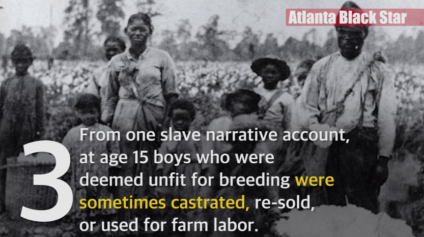
The game is designed to teach children about the Middle Passage, according to Simon Egenfeldt-Nielsen, CEO of Serious Games Interactive. The game allows users to follow a ship as it picks up slaves in Africa. However, the slaves have stereotypical Black features, wide eyes and big lips. American educators have accused the characters of being blackface. ThinkProgress said one of the characters uses a variation of Mr. T’s catchphrase. The character says, “I pity the fool who messes with Chief Janto.”
Americans were particularly offended by a section of the game called “Slave Tetris,” where users get to cram African slaves into a crowded cargo hold. Twitter user Adam Serwer wrote, “Look you make a game called “slave Tetris” because you think black people’s suffering is hilarious, the end.”
Egenfeldt-Nielsen defended the game in an interview with ThinkProgress. He said “Slave Tetris” was supposed to show the horrors of slavery.
“We just tried to make a game to teach about what we thought was an important topic,” Egenfelfdt-Nielsens said. He also claimed about 10 percent of Danish schools used the game and it had won awards. “We did spend a lot time doing it, We did consult with experts. We didn’t set out to make a racist or inflammatory game. Actually the opposite – a game where you would understand slave trade from the inside by escaping slavery… I have reached the conclusion that no matter what we had done it would have been wrong.”
However, Frank Noschese, a physics teacher at John Jay High School, said the game tries to make light of slavery, a very difficult subject.
“I just think the whole concept of making it a game — it trivializes the atrocity of slavery. There are some topics that are just off limits. There was a debate back and forth and people were saying it was a valuable learning tool,” Noschese said. “It’s not like I’m anti-game but with the games being so powerful you really have to be sensitive about what you’re trying to do with the game. The CEO, part of his defense is it makes kids see the atrocity of it. It doesn’t. It doesn’t.”
Noschese said some subjects are too sensitive to be depicted in a video game.
“I don’t think kids have the capacity yet to do that and the topic needs to be conveyed in a different way. What about the Holocaust? Would you try to get people in railway cars or would you try to manage getting the trains from all across Germany into all of the different concentration camps?”
Steam later removed the “Slave Tetris” portion of the game.
“The game and trailer has been updated,” the company said in a statement. “Slave Tetris has been removed as it was perceived to be extremely insensitive by some people. This overshadowed the educational goal of the game. Apologies to people who were offended by us using game mechanics to underline the point of how inhumane slavery was. The goal was to enlighten and educate people — not to get sidetracked discussing a small 15 secs part of the game.”
Egenfeldt-Nielsen later blamed the uproar over the game on cultural differences between Europe and America. But he also admitted he probably had no business commenting on Black issues.
“And would guess that a lot in the US would just think we didn’t get it, and that is probably very true. We probably don’t. But maybe we are not the only ones not getting it.. Maybe there is just a lot of culturally (sic) differences in what you can discuss and express – and maybe just maybe there are larger issues at stake here then whether slave tetris was bad taste or not… and maybe as a lot of the tweeters say a stupid white dane like me don’t know anything, and shouldn’t be allowed to say a single word about the story of African-Americans,” said Egenfeldt-Nielsen in an email to ThinkProgress.


